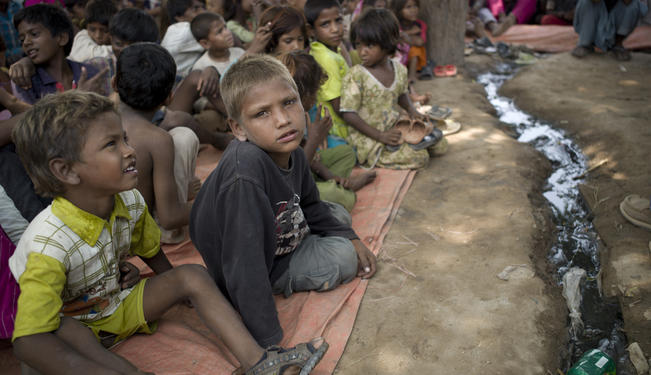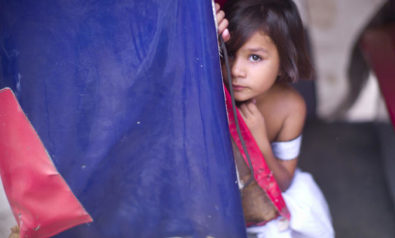What is the biggest challenge facing Pakistan? This is the last of a two part series. Read part one here.
In a conversation with Fair Observer's Nishtha Chugh, the Director of The Samosa, Anwar Akhtar, discusses the origins of Pakistan Calling: a film project in collaboration with the Royal Society of Arts that shows links between civil and cultural organizations in Pakistan and the UK.
Nishtha Chugh: So your program is, for example, going to go to Pakistan, collaborate with role models like Asma Jahangir, Hina Jilani, and then where is the filming going to take place?
Anwar Akhtar: We work with Karachi University film school; we work with SZABIST University film school; we work with Beacon House film school; and they are both public and private universities with a wide cross-section of students.
So, by working with them; The Citizens Foundation; the Human Right's Commission of Pakistan; some more women's welfare organizations; a theater company; conflict-resolution organizations; Save the Children Pakistan; and by working with Oxfam's work in Pakistan, we are going to partner with those organizations and their work with projects in Bradford and Manchester. And so, young people in Bradford or Manchester will be making films about citizenship, education, and integration — projects in Bradford and Manchester will work to help young people find employment and help young people in terms of dealing with guns and conflict resolution.
Chugh: Are they going to receive training, or are you actually targeting people like film school students?
Akhtar: We are going to work with Bradford College and Bradford film school, and help them to engage with working-class Muslim communities in Bradford and show them that it's possible to have careers in film, media, journalism and international relations. And the way in is to develop the skills in college and show them career paths. But at the same time, they have got a huge talent because they can look at work that's happening in Pakistan and realize that their language, their cultural diversity, and their ability to operate in two worlds is actually very powerful.
Chugh: So British Pakistanis and Pakistanis will have a glimpse into each other's lives and then this may be a part of a grander social engineering change, if I am getting it right.
Akhtar: I would not use the word social engineering, but what I would say is the diasporas are very powerful. If you can engage 1.2 million British Pakistani citizens on issues around human rights, development, education, welfare and minority rights in Pakistan, that is huge leverage and it is also leverage that will be trusted by Pakistan much more so than any Western power. So we are talking about an organic set of honest relationships — about building links between young people. The British Pakistani community can lead a process of discussion about Islam; discussion about conflict resolution; discussion about internationalism; discussion about the fact that we live in a globalized world, and it's right that we should contribute to health, education and welfare in Pakistan — as it helps Britain in terms of stabilizing the region, providing trade opportunities, and improving relations with the Muslim world.
If you look at the reviews of Pakistan Calling, some of the most positive reviews come from Belfast, Northern Ireland — from senior people in the Good Friday peace process agreement. They're all from Northern Ireland and were involved in different ways in the peace process. They have been supporting the RSA Pakistan Calling because they understand the potential impact of it. And given the profile Pakistan has, the sheer volume of issues in the region is a huge missing component in the way that you have got a Palestinian diaspora and an Israeli diaspora and they are engaged, regardless of the rights and the wrongs. There is engagement that is up and down the architecture of international relations and development.
That does not exist in the British Pakistani community. So partly it's about that, and partly it's about film and journalism and citizenry given social media.
Chugh: How does the RSA come into the picture and what is their involvement in the project?
Akhtar: The RSA got involved because I did some presentations about the British Pakistani community that worked at The Samosa, and they obviously are interested in all of Britain's communities.
I think there are two things which are very interesting to the RSA. First is taking work outside of London and into Bradford. Because this country is so London-centric and sometimes we forget about what is happening in the rest of Britain — and of course the large Asian communities in Bradford and Manchester. It is great an institution like the RSA can take work outside of London and are very excited by that — they already do a lot of work outside London anyway.
Second, it is about internationalism. The world is changing: We are becoming more globalized, diasporas are more important, and an institution like the RSA is very powerful and can engage the World Health Organization and UNICEF. If we can connect that to working-class Asian communities, have a dialogue, and get remittances aligned to development funding, that will be much more powerful (again, that is the type of thing this project can look at).
But I do not want to go out too much. I want to keep coming back to the basics, which is to build partnerships between communities and institutions in Britain and Pakistan.
Chugh: Why do you think parts of the diaspora are socially excluded?
Akhtar: I think the success stories in the British Pakistani community tend to keep a very low profile. There's the first generation of British-born Pakistanis. I'm talking about British-born, not our parents who came here from the villages and rural areas of Pakistan. The first generation of British Pakistani success stories are law, medicine, the sciences, engineering, businesses, retail, etc. So you've got a very silent professional class. You've got a very large retail, textile and business class.
Chugh: This is true of the Indian diaspora as well.
Akhtar: Yes, I think it's slightly different because the Indian diaspora has got a larger middle-class and a larger mercantile class. However, the vast majority of British Pakistanis are from villages. The British Pakistani community does not tend to come from Karachi or Lahore. The migration from Pakistan was very rural and very working-class, while India's had a larger middle and professional class.
And so you've got this very large Pakistani professional class, in what I call the silent professions. And so throughout the 1990s, because of the sensitive issues around Islam, the professionals have been very quiet and have not really spoken out in areas concerning politics, culture, or the arts of international relations.
Chugh: Is it partly due to the fact that Pakistan in the past decade has been in the media for all the wrong reasons — because of the radical elements and especially after 9/11? Is this why they have taken a backseat?
Akhtar: That probably is, but there is also a kind of complexity concerning what Pakistan has done. It has, with the active endorsement of the West vis-a-vis Charlie Wilson's War, backed the mujahideen which created the Taliban. And this was supported by America in terms of its Cold War foreign policy.
So I think there was genuine confusion within the British Pakistani community in the 1980s. Pakistan were the "good guys" helping to defeat the Soviet Union and the mujahideen were "heroes." In fact, you watched all these films with James Bond and Rambo standing together with the mujahideen fighting the "evil" Russians. But today, Pakistan is the "bad guy."
And so I think there's a genuine cultural identity issue that needs to be looked at, addressed and discussed — but lawyers, doctors, engineers, physicians, and surgeons are not going to do that. As a working-class diaspora that's been preoccupied with the professional career network, British Pakistanis don't go into the arts, culture and media, because second generation working-class immigrants don't enter those careers. You don't have the social capital or the peer capital.
So partly, Pakistan Calling is about opening up some of these issues regarding working-class access to the arts, media, journalism and international relations. One, because of social equality; and two, because it's a no-brainer that engaging the diaspora is a good thing. That is changing with my generation. I think Pakistan is a complicated country, but I'm not going to say it is the bad press. It is a complicated country and part of understanding this complexity is to engage the diaspora. I will go right back to what I said about our parents' stories of partition: the narratives of migration and the narratives of working-class diaspora stories are in Pakistan Calling. There are lots of films of British Pakistanis and their connections to Pakistan.
Chugh: You discussed all the problems that need to be addressed but to begin with, what are the most pressing and compelling problems you're going to look at, examine, or have exchanges on? Will this be education, violence against women, or something else? There's a whole list.
Akhtar: I think we have done a really strong job in raising awareness about the issues facing Pakistan. So we know there are challenges concerning poverty, but issues also include a rising population; a failure to provide infrastructure; a failure of food security; a failure of accountability; and a failure of investment in education. Therefore, if you look at Pakistan Calling, you will see five or six things that very neatly document that.
We've given a platform to some of the most important and powerful women's rights campaigners to talk about the issues around the sectarianism, violence against women, and a lack of access to law and order. One thing which has increasingly come out is that the issue isn't just about sectarian violence. Instead, it's about a breakdown of law and order and the need to have law and order in civil society. So we've already raised awareness on different issues.
The next stage — and the much harder stage — is whether we can get institutions who are doing great work in Pakistan to partner with institutions in Britain. Here, there could be a mutual benefit that helps both players. In doing so, young people in both Britain and Pakistan can work together.
The views expressed in this article are the author's own and do not necessarily reflect Fair Observer’s editorial policy.
Image: Copyright © Shutterstock. All Rights Reserved
Support Fair Observer
We rely on your support for our independence, diversity and quality.
For more than 10 years, Fair Observer has been free, fair and independent. No billionaire owns us, no advertisers control us. We are a reader-supported nonprofit. Unlike many other publications, we keep our content free for readers regardless of where they live or whether they can afford to pay. We have no paywalls and no ads.
In the post-truth era of fake news, echo chambers and filter bubbles, we publish a plurality of perspectives from around the world. Anyone can publish with us, but everyone goes through a rigorous editorial process. So, you get fact-checked, well-reasoned content instead of noise.
We publish 2,500+ voices from 90+ countries. We also conduct education and training programs
on subjects ranging from digital media and journalism to writing and critical thinking. This
doesn’t come cheap. Servers, editors, trainers and web developers cost
money.
Please consider supporting us on a regular basis as a recurring donor or a
sustaining member.
Will you support FO’s journalism?
We rely on your support for our independence, diversity and quality.








Comment